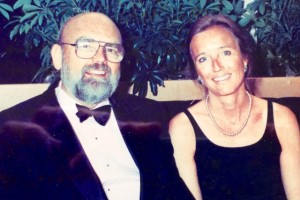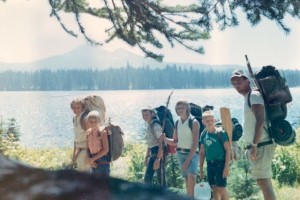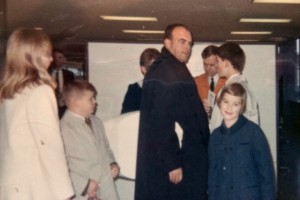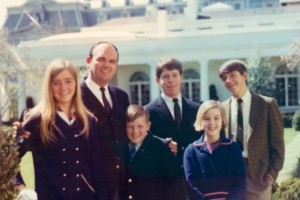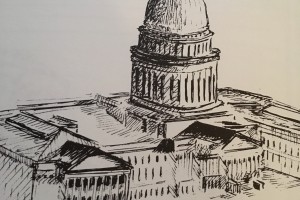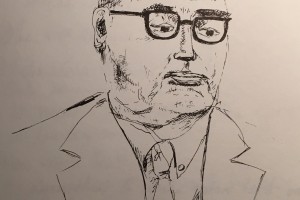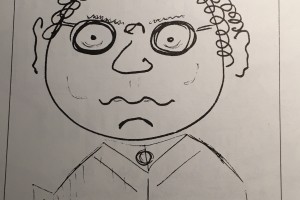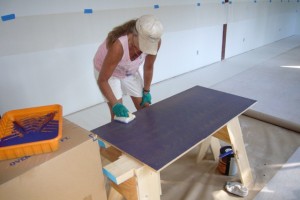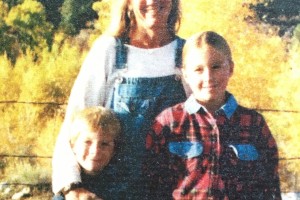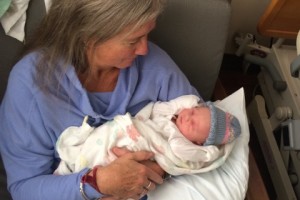In 1976, Jan was 23, slim, blonde, athletic, a talented pianist, fresh out of Principia College. She’d had a privileged upbringing, she’d even met presidents. To use a phrase popular at the time, the world was her oyster – or should have been.
But her father was John Ehrlichman, recently convicted of conspiracy, obstruction of justice, and perjury for his role in the Watergate cover up. And she was very close to her father – especially so. Maybe they were bound by having made significant mistakes.
John Ehrlichman had moved to Santa Fe, New Mexico to escape the press and bide his time before going to prison. He had also separated from Jan’s mother, who “took it hard” according to Jan.
At that time, divorce was not commonplace, public officials were believed to be honest, and having a child was reserved for the married.
Not sure what to do or where to go – Santa Fe? Home to Seattle that was no longer quite home? Jan took a job for the summer at a camp in Maine. As a self-proclaimed tomboy, experienced sailor and camper, it must have seemed like a good place to retreat to before facing the realities of adulthood. Of being on her own. And being known as the daughter of the disgraced John Ehrlichman.
She was facing the third big challenge in her young life.
From Seattle to the seat of power
Jan was uprooted in high school. One of five kids, she was living a normal Seattle life, school, friends, sports. Her father was an urban land use and zoning attorney. He made a decent living and the family had standing in the community. Jan, second child and oldest girl, remembers a good life, always going camping as a family and taking trips to Mt. Rainier. She said her dad loved fishing and enjoyed teaching the kids to fish.
“He was an outdoors guy,” Jan said. And although she said her dad “was strict,” Jan seems to remember those childhood times in Seattle fondly.
When she was 16, her father moved the family across the country to another Washington – DC, far away in both distance and culture from the laidback West Coast. Ehrlichman followed his friend H. R. Haldeman to work in the Nixon White House. It was an honor and a very powerful job – too good to resist.
Political activism was not entirely new to Ehrlichman. According to Jan, her parents met at UCLA as undergrads, and it was politics that brought them together. John Ehrlichman was working on a candidate’s campaign for student council president, her mother-to-be was campaign manager for a rival candidate, H. R. Haldeman. That was the beginning of the life-long Haldeman – Ehrlichman connection.
Dad’s road to the White House
H.R. Haldeman may have had more political ambition than Ehrlichman (after all, Haldeman was the one running for office in college, John was a campaign manager – a good team). He enlisted John to work for Richard Nixon’s unsuccessful Republican presidential bid in 1960 and his unsuccessful gubernatorial bid in California in 1962. Jan remembers her dad being on the road a lot when she was young.
Then, according to Jan, Nixon asked Ehrlichman to be “tour manager in charge of all the advance men” for his presidential bid in 1968. To make a long story short, Nixon won, and Haldeman and Ehrlichman were invited to be part of Nixon’s inner circle, Haldeman as Chief of Staff, and Ehrlichman as Counsel to the President. He very soon became Advisor to the President for Domestic Affairs, a position he held until April 1973. His office was right above the Oval Office in the White House.
Heady stuff – not only for a Seattle attorney, but also for his family.
Jan found herself at Langley High School in Langley, Virginia, a suburb of DC. Many of her classmates were children of the Washington political elite, for example, a Rehnquist (whose father, William, became Chief Justice of the United States), the son of Peter McCloskey, a congressman from CA, and lots of “military kids.” She still speaks of it with a touch of awe.
“I remember going to Camp David a lot with the Haldemans. I was in my teens, and recall being worried that my younger brother and sister would think this was normal life – sitting by the pool and having people in uniform wait on us – get us soft drinks whenever we wanted,” Jan said. And there were parties, political events – and the knowledge that her father was a very powerful man.
“We didn’t talk politics at home, but we’d have to wait dinner until he got home. Being part of it all was pretty cool, actually,” Jan said.
Dabbling in politics and in life
So when Nixon was running for a second term for the 1972 election and John Ehrlichman’s job was on the line, Jan worked on the presidential campaign. After her freshman year in college, Jan, home in DC, was in the thick of it, part of a group of children of the powerful. Among them were Hank Haldeman, her good friend for years and son of H.R. Haldeman, and Jack Ford, son of President Gerald Ford (He became President when Nixon resigned the presidency). They shared a lot – felt the urgency and energy of political campaigning, of working together for a common goal. It must have seemed like membership in an exclusive club.
And although being with the political elite was not new, this was the first time Jan took an active role in politics. It also led to one of the most significant experiences of her life. Her second immense challenge before the age of 21.
Although the ‘60s saw the advent of “free love,” love and sex without marriage, in the early ‘70s, it was still a bit radical. And for Jan, it was anything but free. Young and impressionable, and a child of the ‘60s, Jan fell in love and became pregnant. It was 1972, she was the daughter of a national leader.
Jan was packed off to England. The story was she went there to be a nanny. She lived with people she had never met, friends of friends, a “wonderful family,” Jan says now and she did indeed, take care of their two small children. She had to change her name because her dad was on the front page of the London Times almost every day. She watched him every night on BBC news.
And, said Jan, “I hid. I spent a lot of time in my room, reading, writing.”
She was there for five months, had the baby, a girl, and adoption was arranged. “It was a very, very hard time,” Jan said. The world – and more importantly, her family, told her to forget her child.
After that traumatic year, she went back to Principia College.
Then there was Watergate – her father accused of conspiracy, obstruction of justice, and perjury. Washington in turmoil.
The day after she got back from England, Jan and her mother took Ehrlichman to Capitol Hill where he was on the hot seat, answering questions from senators for five days, trying to defend himself against charges that would destroy his career. So several days after getting home, Jan, with her mom and dad, left Washington in disgrace to drive back to Seattle.
It was not all bleak, according to Jan. As they drove, they read letters of support, about a thousand. And everywhere they stopped, Jan said, “People recognized Dad… waitresses would ask for his autograph. It was weird because he’d never been recognized before. Everyone was supportive. We still have all those letters.”
So although John Ehrlichman was one of the most notorious wrong-doers of the time, Jan doesn’t speak of disgrace or shame, “When someone in your family is getting attacked,” she said, “you’re dealing in survival mode.”
From cool to not
So with her father convicted of serious crimes, her parents separated, her child somewhere in England, and summer camp season over, Jan took a slow road trip across the U.S. intending to end up at her mother’s home in Seattle. She stopped in Santa Fe to visit her father. They talked about “everyday family things,” and as they sat outside under the bright orange setting sun, he had a request.
“He said he thought it was time for him to begin to serve his sentence and not wait for his appeal to be considered. He didn’t think it would come through – and he wanted to preempt the press. So he asked me to take him to prison,” Jan said.
She drove him to a jail in Arizona where he served one and a half years of a two and a half – to eight -year sentence. According to Jan, “He had two sentences – served concurrently – one for the Ellsberg trial, one for Watergate – he was the only top advisor who had two sentences.”
What did this ex-presidential advisor, Washington power broker, do in jail? He worked the night-shift in the basement boiler room. He considered himself lucky to have that job because “it was quiet and there were only two other inmates there,” Jan reported he said.
Jail may not have been as hard for John Ehrlichman as for some others. According to Jan, he said it gave him time to write. He went on to publish several books.
Jan visited him twice for a couple of days at a time.
“Dad was a pretty hard person to be close to,” she said, “so it was scary for me. I had never had that kind of time with my dad. It was a little bit intimidating – he was an intimidating guy. He’d never sat down and had a long conversation with us [kids] one on one.”
It was an important time for them. “It was when I really got to know him,” she said. “He talked quite a lot when he was there. We’d sit out on the patio of the prison for eight hours at a time. My siblings hadn’t gotten into trouble – that was another reason I was able to be close to dad. Dad had to deal with me as an adult,” Jan said.
She and Ehrlichman had a special connection. She, like him, had lived through a personal tragedy that left a deep mark on her soul.
And although John Ehrlichman’s public life was over, Jan’s was just beginning.
Perhaps the worse was behind her and now the world would become her oyster.
Her young adult life
Jan made it back to Seattle to her family home and her mother. And her life took on some normalcy. A friend of her mother’s was a professor in the music department at the University of Washington and needed an assistant to teach her piano class. Jan enrolled in a master’s program for a MAT, Master of Arts in Teaching, in the music department and taught piano for a year. (Among her students were football players – “in the class to get an easy A”. When Jan asked them what they wanted out of the class, one of them said – to take you out for a beer. She still remembers the moment.)
Jan had met a guy at college at Principia, a Christian Science college in Illinois. He had left because it was too restrictive and finished his degree at the Univ. of Washington. She ran into him in Seattle, they connected, fell in love, and decided to marry. They married on her dad’s first furlough from prison. He went to their wedding in Seattle at her mom’s home.
“It was a tough weekend,” Jan said, with her parents split up. Her dad didn’t go to the reception – he came over to see the newlyweds after the reception – on neutral ground, at their apartment.
Teaching and painting houses
Her husband, Mark, had painted houses to put himself through school. So to supplement their salaries, during summers off from teaching, they painted houses, inside and out. Mark first taught Jan to paint the trim.
“I was good at it. Careful,” she said. She soon graduated to full painting responsibilities.
Then Mark got a job as the headmaster for a private school and they moved to Southern California. Jan taught piano at home then taught English at Chadwick Middle School, a different private school from her husband. She said she loved teaching English.
A moment of shame – just one
It was when she was teaching in California that she felt a moment of shame, her only one regarding her dad.
“A history teacher said he was going to play the tapes from the Watergate Senate hearings for his students. I asked if I could sit in. When my father was testifying, the kids began to snigger and laugh. It was the only time I ever felt ashamed,” she said.
A different perspective
Marie Brennan, a contemporary of Jan’s, would be surprised to hear that. She, too, was a young woman on the Washington scene in the early 1970s. A 22-year-old cub reporter, a self-proclaimed idealist, she said she was excited about covering the hub of U.S. power.
She said her bubble burst when the President (Nixon), Haldeman, Ehrlichman, and others, were found to have engaged in dishonest and unlawful activities.
To this now-veteran reporter and author, the Watergate break-in and subsequent cover-up were the beginning of the distrust of government that is rampant today. According to Brennan. “We have not recovered from Watergate.”
But Jan saw and experienced it differently, not from the fact-driven reporter’s perspective, but from the padded cell of family.
The tangle of family
Jan and her husband taught, adopted two children, and tried to make it in expensive Southern California on private school salaries and painting houses.
“It felt so natural to adopt our two kids. As soon as I first saw my daughter and then my son on the days they were born, it felt like they were a part of me. I knew life would be forever good as long as they were a part of my life,” Jan said.
By this time, her dad was out of prison, remarried, writing, and living in Santa Fe. “We’d go see dad for Christmas and probably a couple of other times a year. Santa Fe is a magical place, we got to know it and loved it,” Jan said.
They met some great friends there, so when Mark was looking for a new job, he looked there and landed one, headmaster at a small private school. So they moved to Santa Fe.
“That [my moving to Santa Fe] was always a difficult thing for my mom – it was hard for her to understand it because she was hurting so much still. My dad would bad mouth her to me and put her down. He wasn’t very nice about that.”
Jan visited her mother every summer. So she found herself in the middle often.
Another twist to her life
Jan had kept in touch with the family she stayed with in England. They had actually helped arrange the adoption of her child. And about this time, 15 years after Jan gave her daughter up for adoption, they were visiting. During dinner, she heard an amazing request. She was told that her daughter wanted her to write her a letter.
“I will never forget what it meant to me to sit down and write that letter to my daughter. I cried and cried, but they weren’t tears of sadness. They were tears of hope and of love. I had never thought that I would get the opportunity to write her,” Jan said.
She then received a letter from her daughter, Sophie, along with a photograph. Two years later they met for the first time. It was the beginning of a new chapter of expanded motherhood for Jan.
Being a single mom
Around the time of finding a bigger family connection, came a devastating loss. After moving to Santa Fe, her marriage came unglued and she and Mark divorced. Their kids were one- and five-years old when Mark left her.
“I would never have split the marriage up – when my son was one,” she said with bitterness in her voice.
She hadn’t been working, had been a stay-at-home mom in Santa Fe.
“When my husband left me, I had to work two jobs to take care of my kids. In the summer I rented the house out and went back to Seattle to my mom’s to paint houses. I was dirt poor.”
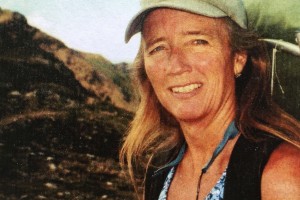 Family came to the rescue. Her sister and brother-in-law bought into the house in Santa Fe so she could stay in it. Her ex wanted her to sell the house, but they bought him out. “It was a great thing to be able to stay in the Santa Fe house,” she said. “I was incredibly grateful to my sister and brother in law.”
Family came to the rescue. Her sister and brother-in-law bought into the house in Santa Fe so she could stay in it. Her ex wanted her to sell the house, but they bought him out. “It was a great thing to be able to stay in the Santa Fe house,” she said. “I was incredibly grateful to my sister and brother in law.”
Jan divided her time between Santa Fe and Seattle in the summers – painting houses on crews of mostly men.
“I grew up with three brothers,” she said, “so I was used to guys.”
Meanwhile, her dad moved to Atlanta (where he died in 1999). And Santa Fe seemed more and more full of the rich.
“I’d pull up to school to pick up my daughter and I’d be in my paint-spattered clothes and the other mothers would be all made up and dressed up,” Jan said. “My daughter was OK with it.” But Jan noticed.
She moved back to Seattle, where her mother and all of her siblings lived and still do. She got licensed and bonded as a painting contractor and formed her own company.
Jan’s life today…
She’s in her early 60s and retired. Her children are grown. Her English daughter (as she often refers to Sophie) has moved with her husband to Seattle. Her second daughter recently made her a grandmother. She’s happily married, having met her current husband on a job. (He’s a cabinet maker.) She’s been teaching music, volunteering at a film festival (“I get to see a lot of films that way”), is on several non-profit boards, is a page-turner for the pianist for the Chamber Music Festival, is in Orcas Choral Society, and plays tennis often.
And although Jan has remarried, she keeps the name Ehrlichman. That’s a clue. The name, to her, to them, has not been totally besmirched by John’s role in Watergate.
“There are lots of Ehrlichmans in Seattle, lots,” she said. They are known and respected there. One of her brothers is a well-known attorney, her mother married a Washington state senator.
Summing up her life
When asked how she would sum up her life, she said “Equanimity – as a single mom working two jobs, it was the toughest time of my life but I was able to do it because of what I experienced in England. Dealing with hardship and being graceful about it… that’s important to me.”
Interestingly, in a 1970s article, John Ehrlichman is quoted as saying the exact same thing, “equanimity” – composure, mental and emotional stability – was most important to him, too.
Now that she has time, Jan’s been digging into her father’s past.
Her English daughter seems to share Jan’s interest in John Ehrlichman. They’re researching Watergate together, “I want to have it completely clear. It’s a matter of family history,” she said. They’ve talked about writing a book someday.
Jan is not the only one still trying to figure out Watergate (several new books have been published recently*), but she’s the only one who really cares deeply, who looked into Ehrlichman’s eyes as he walked through the prison gates.
“My life has been an adventure – it had so many different layers to it. All the adversity has made me who I am. I think adversity makes you a stronger person,” Jan said.
So maybe, after all, the world has been Jan’s oyster – bumpy and hard on the outside, but she’s found the pearls within.
________________________________________________
Copyright, Bojinka Bishop, 2016
Thank you to Jan Erhlichman for the photos , Ehrlichman’s sketches, and her generous cooperation.
* New books include The Real Watergate Scandal, by Geoff Shepard, 2015; The Last of the President’s Men, by Bob Woodward, 2015; and Casting Shadows; The Nixon Tapes, the Chennault Affair, and the Origins of Watergate, by Ken Hughes, 2014.
If you enjoyed this story – please share it with your friends! Via email, Facebook, or Tweet about it.
For more stories about people who have lived unique lives, click on the People tab in the blue bar at the top of the page.

